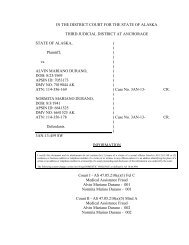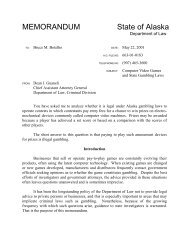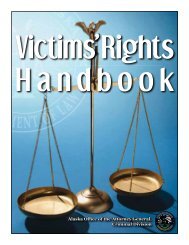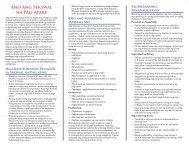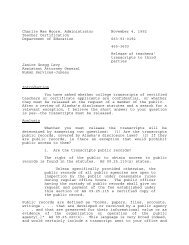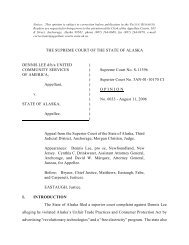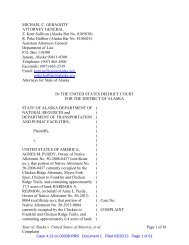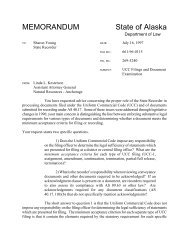Initial Report and Recommendations - Alaska Department of Law
Initial Report and Recommendations - Alaska Department of Law
Initial Report and Recommendations - Alaska Department of Law
- No tags were found...
You also want an ePaper? Increase the reach of your titles
YUMPU automatically turns print PDFs into web optimized ePapers that Google loves.
example, during a protracted negotiation process that culminated in August 1990, theState <strong>and</strong> several tribes negotiated an ICWA Agreement that was eventually signed by 27tribes. The Agreement, which was negotiated before certain jurisdictional issues hadbeen resolved in John v. Baker 61 <strong>and</strong> C.R.H., 62 “reserved for future negotiation <strong>and</strong>discussion” issues relating to tribal courts, jurisdiction, <strong>and</strong> state funding for socialservices <strong>and</strong> for children placed in foster homes by a tribe. It is time for thosenegotiations <strong>and</strong> discussions to be continued.Section 1919 <strong>of</strong> the ICWA provides a mechanism to encourage state-tribalcooperation <strong>and</strong> collaboration: “States <strong>and</strong> Indian tribes are authorized to enter intoagreements with each other respecting care <strong>and</strong> custody <strong>of</strong> Indian children <strong>and</strong>jurisdiction over custody proceedings.” Similarly, state law expressly authorizes the<strong>Department</strong> <strong>of</strong> Health <strong>and</strong> Social Services to enter into agreements under ICWAconcerning the “jurisdiction <strong>of</strong> Native child custody proceedings.” 63 Collaboration <strong>and</strong>cooperation in other aspects <strong>of</strong> child protection should also be accomplished to improvethe overall quality <strong>of</strong> services available to those families in need.The Commission recommends development <strong>of</strong> a state-tribal ICWA agreement forconsideration by the State <strong>and</strong> <strong>Alaska</strong>’s tribes. 64 With the assistance <strong>of</strong> work groupmembers, the Commission devoted considerable time to development <strong>of</strong> a modelagreement <strong>of</strong> this kind. The willingness <strong>of</strong> all <strong>of</strong> the stakeholders to work toward anacceptable agreement left a great impression on the Commission. Unfortunately, the task<strong>of</strong> developing a proposed agreement could not be finished in the available time.There is also substantial need for tribal-state partnerships on juvenile justicematters. Some tribal courts <strong>and</strong> councils work very effectively with juveniles <strong>and</strong> theirparents to respond to a juvenile’s delinquent or troublesome behavior, <strong>and</strong> there is noneed for state participation in the matter. Where the tribal government is able toeffectively address the needs <strong>of</strong> the juvenile <strong>and</strong> the community, it may prefer not toencourage state involvement, so that the <strong>of</strong>fending minor does not acquire a state juvenilerecord.Other village justice systems, however, would prefer to coordinate more closelywith the Division <strong>of</strong> Juvenile Justice (DJJ) <strong>and</strong> might, with DJJ’s consent, wish to refer ajuvenile to the Division. The Commission therefore urges DJJ to discuss with interestedtribal courts whether such a referral mechanism might be achieved <strong>and</strong> then makeagreements with tribes <strong>and</strong> tribal courts to coordinate the disposition <strong>of</strong> juvenile <strong>of</strong>fensesas currently permitted under state law. 656162636465John v. Baker I, 982 P. 2d 738 (1999) (recognizing inherent tribal jurisdiction in a custody disputeinvolving tribal children).In the Matter <strong>of</strong> C.R.H., 29 P.3d 849 (<strong>Alaska</strong> 2001) (upholding transfer jurisdiction under ICWA).AS 47.14.100(g).Recommendation 4. Specific to this recommendation, “such an agreement would take into account thechanges in the law that have taken place since 1990 <strong>and</strong> reduce the number <strong>of</strong> issues over which theState <strong>and</strong> tribes are currently litigating. It would also provide a template for cooperation between theState <strong>and</strong> tribes that could provide a model for other topics.”Recommendation 5.<strong>Alaska</strong> Rural Justice <strong>and</strong> <strong>Law</strong> Enforcement Commission - Page 43




